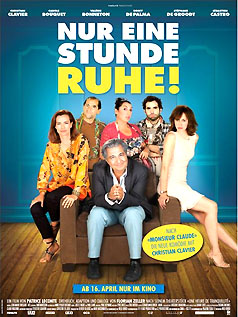
France 2014
Opening April 16, 2015
Directed by: Patrice Leconte
Writing credits: Patrice Leconte
Principle actors: Christian Clavier, Carole Bouquet, Valérie Bonneton
 How often have we wished for just one hour of peace (eine Stunde Ruhe) and quiet to do what we like best, perhaps read, or listen to music, or read our emails? A simple wish, which Michel Leproux, an eye doctor anticipating a quiet weekend at home, looks forward to. He walks into his nice apartment with a rare jazz recording which he just bought at the local flea market. What a find! Now: to sit back and listen to it.
How often have we wished for just one hour of peace (eine Stunde Ruhe) and quiet to do what we like best, perhaps read, or listen to music, or read our emails? A simple wish, which Michel Leproux, an eye doctor anticipating a quiet weekend at home, looks forward to. He walks into his nice apartment with a rare jazz recording which he just bought at the local flea market. What a find! Now: to sit back and listen to it. Naturally, we know that this will never happen. His wife rushes in to tell him something “really important” that happened 30 years ago. Workmen, painting in the next room, break the pipes, and water floods the apartment below. Son Sebastian has no sense of responsibility towards his parents, but a huge feeling for refugees, whom he allows to stay, five or six to a room, in the apartment above. The soaked downstairs neighbor moves his block party upstairs to Michel and total strangers dance in his living room. His worthless best friend Pavel, as well as his wife’s best friend (and also Michel’s lover) Elsa, ring the doorbell. They are determined to clear their conscience of past infidelities, which can only make life more complicated. His mother calls.
This French film originates from the play of the same name by Florian Zeller. An interview in the Hamburger Abendblatt said that the play is what we would call a boulevard comedy, originally created by playwright Georges Feydeau between 1890 and 1920. I had the great luck to see both film and play; both are excellent. Still, plays don’t run forever or in all cities, but this film will certainly be available somewhere and you should not miss it. It’s important to understand the language (in my case it was French with English subtitles), because the lines flow quickly, non-stop, creating a snappy communication between the characters. I could hardly take notes, because I feared missing even one line of the humor, frustrations, confessions, or even comments about Polish workers. The film stays mostly in the apartment, as does the play, naturally. But contrary to the play, the film goes to the stairway, a café, the street, and, finally, to the hideout where Michel finally turns up to listen to his record. ()
